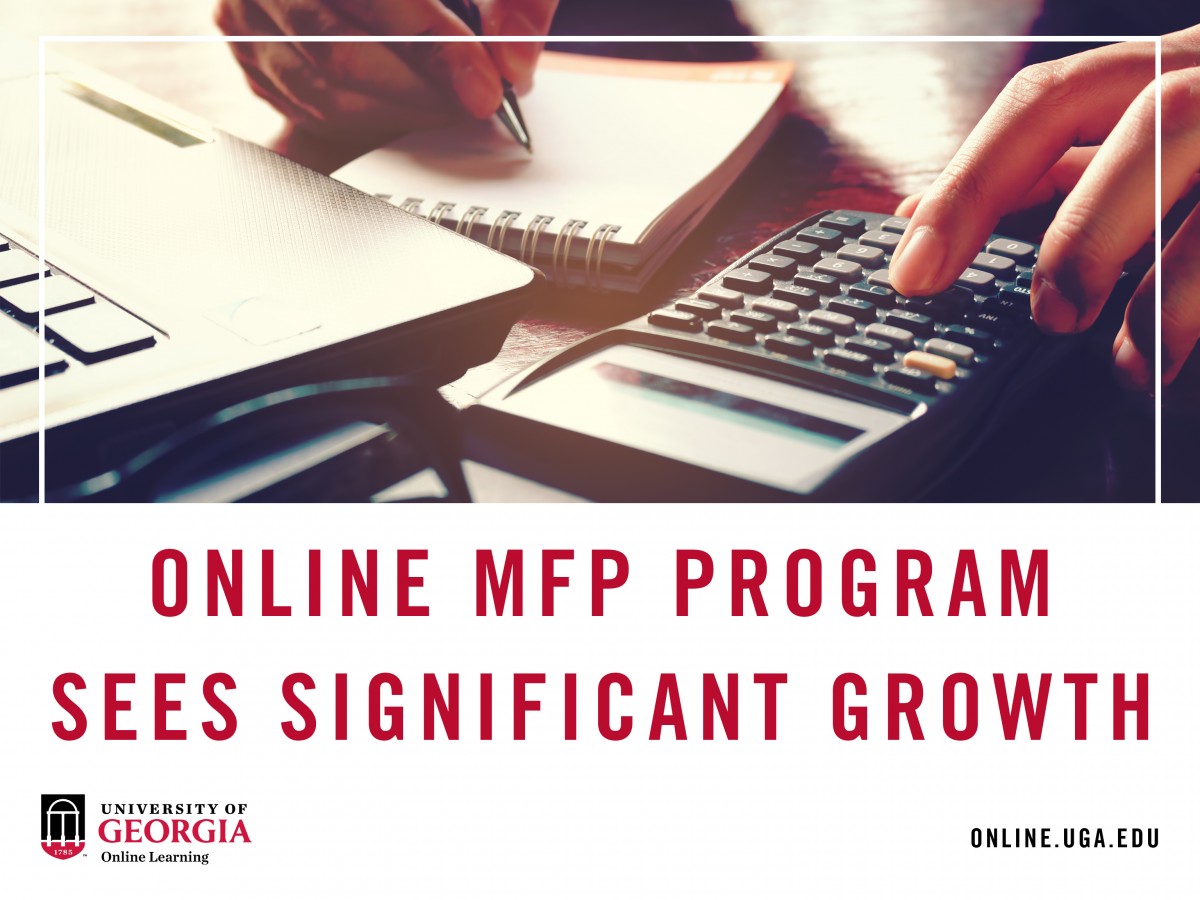Masters of Financial Planning Program expands in response to high demand
Masters of Financial Planning Program expands in response to high demand
The University of Georgia’s online M.S. in Financial Planning has been a fast-growing and expanding program due to the increasing job market for financial planners and UGAs reputation.
The financial planning industry has seen a good amount of growth and is expected to continue growing by 4% from 2019 to 2029. The demand in the industry along with a growth in student demand has led the Master’s in Financial Planning (MFP) to expand their program to accept more than twice as many students per year.

“We added a January admission cohort this past year and are pleased with the increased interest in this degree program. For some, this is the ideal time to improve their skillset in preparation for a career change or advancement. Our online master’s in financial planning offers that opportunity,” said Sheri Worthy, the department head for the Department of Financial Planning, Housing and Consumer Economics.
The MFP program professors, faculty, and staff work hard to create the best environment for students while they are studying in the program.
“The financial planning faculty have been working very hard on creating the best online experience for our online master’s students,” said Worthy.
The MFP program accepted their first cohort in the Fall of 2014, since then they have had constantly increasing numbers. In 2019, the MFP program accepted 20 individuals and by 2020 they had expanded to accept 49 new students.
“This degree just creates more flexibility and options for where I can take my career in personal finance. I’m super excited to see what the future holds,” said Da-zha Jones, an MFP program Summer 2020 graduate.
The faculty were turning away students due to the high volume of interest and wanted to expand the program to meet the demand without sacrificing quality. They wanted to scale it in a way that would ensure the quality online education they were providing could continue and if possible, improve. Worthy reached out to UGA’s Office of Online Learning to gain guidance from our instructional designers.
The instructional designer for the MFP program, Stephanie Gilstrap, has been working with the faculty for the past two years to improve MFP students’ experience with their online platform.
When the MFP program started they had 5 instructors with different types of course layouts and expectations. Gilstrap led all 5 professors simultaneously through course redesigns that created a consistent pattern for students within the program. This has improved students’ ability to understand the expectations, online platform, and material the professors of the MFP program issue for their students.
The Instructional Designer (ID) and professors collaborated on design sprints which is an approach developed by UGA’s ID team to streamline the process of designing or redesigning an online course. Throughout this process, the ID and the professors spend one-week planning the primary components of their course. This includes the learning objectives, which highlight what students need to learn from the module, and the major activities such as papers, projects, tests, etc. that would be due in that module in a week-by-week layout. Then for the months to follow, the professors and ID develop the courses further by finding readings, videos, and other materials that will offer the best learning outcomes for the students.
The design sprints help create modules in a semester time frame. When first designing the modules, they spend the fall semester developing courses to launch in the summer and they spend the summer semester developing courses to release in the fall and continue through the spring semesters.
Going through the design sprints together allowed the program instructors to develop courses side-by-side which lead to more communication between the faculty in the program. This new level of communication allowed the courses to work together for a more cohesive online degree program. The communication also led to professors combining resources and assignments for students to do while in the program so they have an easier time moving between classes.
The most important aspect of redesigning a course is to engrave clear expectations with rubrics and modules for the course. This allows for instructors and students to focus more on the content than the formatting of papers, the structure of tests, and assignment due dates.
“I love the new templates. The look of the program is so much better. Our pages, ppts, zoom backgrounds, etc provide a polished and professional look that is matching the caliber of the program. The assignments are clearly presented, and rubrics provide distinct objectives. It’s such a time saver and allows me to focus on the content that I need to focus on,” said Mary Carlson, The lead faculty for the online Master of Science in Financial Planning program.
“The willingness of the instructors and having a consistent goal to have instructors collaborating to help their students be more successful will allow the program to continue moving forward,” said Gilstrap.
